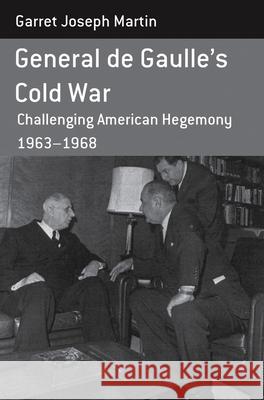General de Gaulle's Cold War: Challenging American Hegemony, 1963-68 » książka
General de Gaulle's Cold War: Challenging American Hegemony, 1963-68
ISBN-13: 9781785330315 / Angielski / Miękka / 2015 / 282 str.
General de Gaulle's Cold War: Challenging American Hegemony, 1963-68
ISBN-13: 9781785330315 / Angielski / Miękka / 2015 / 282 str.
(netto: 130,37 VAT: 5%)
Najniższa cena z 30 dni: 135,22
ok. 30 dni roboczych.
Darmowa dostawa!
..".a well-written, vibrant presentation of how world events interacted with and impacted de Gaulle's grand design, creating a comprehensive understanding of the general in the Cold War. Highly recommended." - Choice "While there is a lot of information for readers to take in, the subject is inherently complex, spanning different aspects of French foreign policy and the politics of other countries and institutions. In spite of this complexity, Martin displays a good grasp of the material." - H-France Review The greatest threat to the Western alliance in the 1960s did not come from an enemy, but from an ally. France, led by its mercurial leader General Charles de Gaulle, launched a global and comprehensive challenge to the United State's leadership of the Free World, tackling not only the political but also the military, economic, and monetary spheres. Successive American administrations fretted about de Gaulle, whom they viewed as an irresponsible nationalist at best and a threat to their presence in Europe at worst. Based on extensive international research, this book is an original analysis of France's ambitious grand strategy during the 1960s and why it eventually failed. De Gaulle's failed attempt to overcome the Cold War order reveals important insights about why the bipolar international system was able to survive for so long, and why the General's legacy remains significant to current French foreign policy. Garret Joseph Martin is an Editor-at-Large at the European Institute in Washington, DC. He obtained his PhD in International History at the London School of Economics. He co-edited Globalizing de Gaulle: International Perspectives on French Foreign Policies, 1958-1969 (with Christian Nuenlist and Anna Locher, 2011). He currently teaches courses on the Cold War at George Washington University and on transatlantic security at American University.
"...a well-written, vibrant presentation of how world events interacted with and impacted de Gaulles grand design, creating a comprehensive understanding of the general in the Cold War. Highly recommended." · Choice"While there is a lot of information for readers to take in, the subject is inherently complex, spanning different aspects of French foreign policy and the politics of other countries and institutions. In spite of this complexity, Martin displays a good grasp of the material." · H-France ReviewThe greatest threat to the Western alliance in the 1960s did not come from an enemy, but from an ally. France, led by its mercurial leader General Charles de Gaulle, launched a global and comprehensive challenge to the United States leadership of the Free World, tackling not only the political but also the military, economic, and monetary spheres. Successive American administrations fretted about de Gaulle, whom they viewed as an irresponsible nationalist at best and a threat to their presence in Europe at worst. Based on extensive international research, this book is an original analysis of Frances ambitious grand strategy during the 1960s and why it eventually failed. De Gaulles failed attempt to overcome the Cold War order reveals important insights about why the bipolar international system was able to survive for so long, and why the Generals legacy remains significant to current French foreign policy.Garret Joseph Martin is an Editor-at-Large at the European Institute in Washington, DC. He obtained his PhD in International History at the London School of Economics. He co-edited Globalizing de Gaulle: International Perspectives on French Foreign Policies, 1958-1969 (with Christian Nuenlist and Anna Locher, 2011). He currently teaches courses on the Cold War at George Washington University and on transatlantic security at American University.











